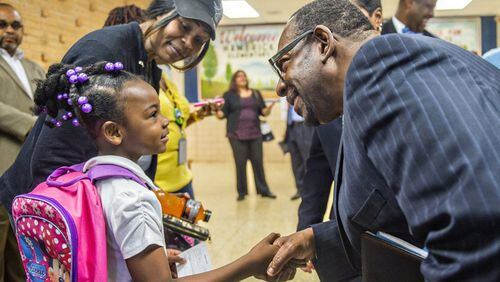In this essay, DeKalb Superintendent Steve Green offers Gov. Nathan Deal suggestions on creating an effective school reform plan.
By Steve Green
Gov. Nathan Deal has told the Georgia General Assembly early in the 2017 legislative session that his administration will focus on education reforms. In coming months, the citizens of DeKalb County and the rest of Georgia can expect a lot of talk about our public schools and how to improve them. Discussions will swirl on standard hot topics: School choice. Vouchers. Use of public tax money for private-school education. Responsible funding, and so on.
The real issue in public education isn’t any one of these flashpoints. Our basic discussion should be much simpler: How do we give students what they need to succeed?
Providing each student – gifted, mentally challenged, expatriated, or burdened by distracting socioeconomic or family needs – with the foundational elements to succeed in schools should be the real issue at the center of new legislation.
We in the DeKalb Country School District welcome Gov. Deal, along with state and federal leaders and all other parties with a role in the proposed legislation, to join us at a point of common understanding.
It’s time to bring together resources … and resourceful collaboration … to support socioeconomic improvements that boost schools and students.
As school superintendent of Georgia’s third-largest district, it’s my strong opinion that a partnership fully locked in on solving the real problem of education – the socioeconomic factors – would do more good for students than school choice legislation.
Last May, I met with Gov. Deal and his staff, and I felt a willingness from the governor to consider new ways of looking at old issues. We discussed big-picture problems, including constant challenges to school families that must be solved if students hope to have a fighting chance in the classroom.
Let me give an example.
Late last year, the DeKalb County Watershed Department cut off water to an apartment complex (Creekside Forest Apartments) that chronically rated below health code. That action forced evacuations and disrupted the lives of dozens of families with school children. Our district mobilized resources to support those students, first working to simply keep up with the suddenly rootless families, then laboring for days to set up safe transportation so kids could continue studies at their home schools.
Problems like these outside the classroom have everything to do with student success inside the classroom. With 135 schools and 102,000 students from 180 nations and with 144 languages, our district constantly deals with a welter of extracurricular problems. To help school families with these serious problems, we simply need more social support services – "wrap-around services," as we call them – meeting needs from basic transportation to family counseling.
That’s job one for us in DeKalb, along with implementing rigor, relevance, and relationships in classroom instruction/learning in every school, including those deemed underperforming.
School choice is not the real issue in DeKalb. Not at all – we’ve actually pioneered choice in Georgia.
Parents and caregivers here can educate their children in charter, magnet, theme, Montessori, IB, dual-language immersion, tech, career pathways, and arts schools, plus our Discovery Learning Academy. We offer 48 kinds of inclusive learning programs that give panoramic learning possibilities to students with every capability, talent … and challenge.
School choice in DeKalb means a choice of traditional schools, too … these are exactly the right fit for some families, and a ready option for all. One student at Cedar Grove Middle School recently earned acceptance into a magnet school, but made a personal choice to stay in a traditional school. The familiar, comfortable learning environment gave this student the best assurance of classroom success.
So the challenge isn’t choice. It’s change.
We need a transformation in understanding why schools struggle. For kids to succeed, we must shift from politics to problem-solving. Schools face a real and growing need for dedicated services and programs that address the severe problems of poverty (mobility, nutrition, emotional, family instability, health, etc.). These problems affect students in ways that no standardized tests can measure.
We invite … no, we welcome … Gov. Deal, along with lawmakers and other potential partners in Georgia’s possibilities, to visit Flat Shoals Elementary, the school where we hustled to find transportation and other support for students and families made homeless by the apartment condemnation. We invite you to see first-hand the challenges students face there … challenges that were met head on with quality school leadership, staff, or curriculum.
You’ll see how support services far removed from textbooks and blackboards can make a profound difference.
At Flat Shoals, our enterprising school principal started an initiative that is having a big impact on the quality of life for students away from classrooms … and directly affecting the quality of learning inside them. Flat Shoals sponsors a monthly breakfast for students and their fathers, uncles, and other significant men in their lives. The breakfast attracts 70 to 100 men each month.
Those men clearly value partnership above politics.
Gov. Deal, let’s make a really relevant school choice: Visit us before you draft any school legislation.
Your visit will open eyes. It will open minds. It might even open hearts.
About the Author







